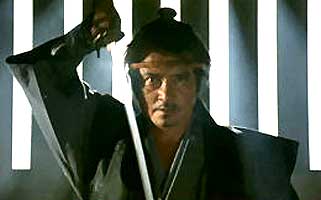 When Japanese cinema was in free-fall decline in the 1970s, mostly only adult-content films & childish youth films & new feature film episodes of Tora-san comedies continued to thrive. When Japanese cinema was in free-fall decline in the 1970s, mostly only adult-content films & childish youth films & new feature film episodes of Tora-san comedies continued to thrive.
The film studios that survived the decline transferred all production to television. The industry was moribund for twenty years, & did not begin a serious restoration of pre-eminence in world cinema until the 1990s.
In the childish camp during the low years were sundry Sonny Chiba vehicles that made large use of the teenagers he trained as stunt artists, each of whom dreamed of achieving star status.
Few of these baby-faced kidniks would ever achieve the dreamed-up stardom, apart from Hiroyuki "Henry" Sanada (who developed into a world-class actor) & more transiently Etsuko "Sue" Shiomi.
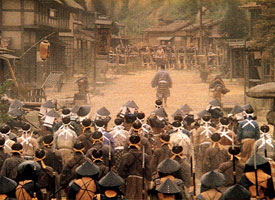 The rest of these stunt-kids who amounted to a hill of beans, & they invariably dragged down the films they were in, unless one prefers cartoon elements to live-action samurai cinema. The rest of these stunt-kids who amounted to a hill of beans, & they invariably dragged down the films they were in, unless one prefers cartoon elements to live-action samurai cinema.
And the stripedy monk-suited ninjas in the opening scene of Shogun's Shadow: The Isanity of Shogun Iemitsu (Shogun Iemitsu no Ranshin: Gekitotsu,Toei, 1989) were about as anime-like as live action gets.
For some that may be a good thing; for those of us who prefer serious & severe samurai action & some attention to character, kitschy Action Club films just don't fill the bill. Shiomi & Hiroyuki had left the Action Club by this time, leaving no reason to see the others at all.
The "club" in total seriously dates every film cluttered up by so many wannabes. Even Seizo Fukumoto, who in Shogun's Shadow was being groomed as Hiroyuki's replacement, falls far short, picked out of the fold because he resembled Hiroyuki rather than for excelling the rest.
As an aside, Hiroyuki Sanada became, in time, a world-class character actor but it's hard to see his future greatness in any of the films he starred in with Shinichi Chiba & the Action Club, which restrict him to a teen idol stereotype. Only by breaking free of the Action Club was Sanada able to mature as the fine actor we can now see in such films as Twilight Samurai (Tasogare Seibei, 2002).
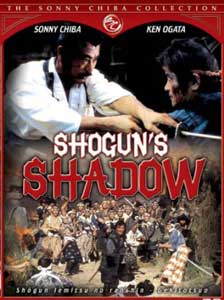 Shogun's Shadow stars Ken Ogata as a ninja bodyguard whose select team has been hired to protect the child heir to the shogunate on his trip cross-country to Edo.
Shogun's Shadow stars Ken Ogata as a ninja bodyguard whose select team has been hired to protect the child heir to the shogunate on his trip cross-country to Edo.
This thin frame of a story is an excuse for a series of "ninja versus samurai" action sequences, the odds stacked heavily against the ninja, & with scarsely any characterization or story to go with it.
In a rather small role is Tetsuro Tamba as Lord Masamori Hotta, who raised the shogun's heir, & has reason to suspect letting the child go to Edo means trouble.
Ken Ogata as bodyguard Gyobu Igo comes close to making the film worthwhile, as he plays his part with a sense of serious commitment & is a powerful screen presence.
Hiroki Matsukata plays key meany samurai Shigeji Abe, committed to killing the wee widdle boy, making more of his role than it inherently embodies. But the good performances are outweighed by too many mediocre performances in too skimpy a script.
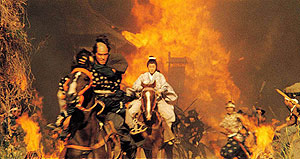 Shinichi "Sonny" Chiba co-stars as one of the key henchmen of the piece; he comes off more like a grease monkey than a samurai, Shozaemon Iba, or Shoza, who serves Lord Abe & is assigned to kill the Shogun's young heir. Shinichi "Sonny" Chiba co-stars as one of the key henchmen of the piece; he comes off more like a grease monkey than a samurai, Shozaemon Iba, or Shoza, who serves Lord Abe & is assigned to kill the Shogun's young heir.
Chiba also directs the action sequences which dominate the film, featuring his Japan Action Club teenage acrobats.
Far too many of the action scenes look more like circus stunts than martial arts, & it is difficult to suspend disbelief because the action fails to convey the spirit of the historical setting. It views like a family-film aimed too much at pre-teens even before the soundtrack screeches its appalling rock 'n' roll pop tunes.
Curiously enough, Chiba makes his own character's fight choreography comparatively stately & dignified with nodachi or extra long sword. It's as though he did not want to look like the ass his choreography makes of nearly everyone else.
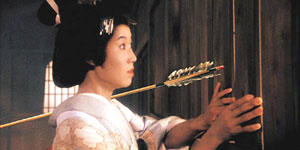 He surrounds himself & much too much of the entire film with Action Club kids pulling absurd antics with twirling spears, flying on ropes, unintentionally whimsical hop skips & jumps with all sorts of mother of camp foolery, pitched to the least discerning kids in the audience. He surrounds himself & much too much of the entire film with Action Club kids pulling absurd antics with twirling spears, flying on ropes, unintentionally whimsical hop skips & jumps with all sorts of mother of camp foolery, pitched to the least discerning kids in the audience.
One slightly interesting camp ingredient is Hu Chien Chiang playing the "monkey style" kung fu monk Shishi Jingoemon. Wuxia fans, who'll know him as an actor & leading stunt coordinator for Shaolin Temple movies, will have to watch closely for his cameo, as he's given no speaking lines.
The third Shogun, Iemitsu Tokugawa (Masaki Kyomoto), is a sickly weakling & not in his right mind. He seems easily manipulated by Lord Abe, who is undermining the shogunate by orchestrating an assassination plot against the Shogun's heir, young-lord Takechiro. But in fact, Abe is a devoted vassal, obedient to the lunatic shogun's personal desire that his own heir be killed.
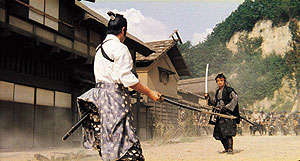 For all the cornpone nature of the film's content, the sets, costumes, & visual arrangement makes for periodic moments of stunning cinematography. For all the cornpone nature of the film's content, the sets, costumes, & visual arrangement makes for periodic moments of stunning cinematography.
The technical expertise underlying the film is not its problem. There's a big "horsemen dropped off blown up bridge" gag copied from a Pekinpah western, but without characters or story of interest to support the visuals, it's all just a decorative paper sack with nothing in it.
There's also also a big fire-gag when a moat of burning oil is worked into the action. A "burning horse & rider" gag is rather extreme, & pretty, though the fake horse looks way too much like a giant rockinghorse toy for it to have the impact intended.
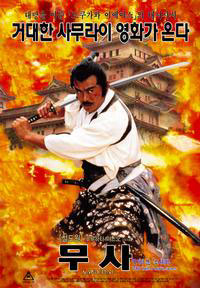 The inevitable duel between Ogata's & Chiba's characters, in a dusty town intended to remind the viewer of better films like Akira Kurosawa's Yojimbo (1961), was one of the few really moody successful sequences. The inevitable duel between Ogata's & Chiba's characters, in a dusty town intended to remind the viewer of better films like Akira Kurosawa's Yojimbo (1961), was one of the few really moody successful sequences.
The comparative success was largely because we know these characters pretty well, so they're not just nameless action toys like most of the supporting cast.
The broader lack of characters who stand out as individuals renders so much of the action impersonal & dull. Even this one extended duel gets silly as good-guy Gyobu & bad-guy Shoza jump out windows & climb to roof peaks, flailing their swords struggling not to look too awfully absurd.
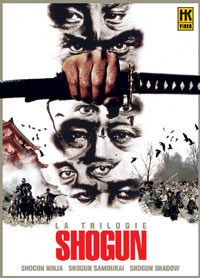 The encounter ends with Gyobu's sword broken, thus certain to lose against the bad guy, but not necessarily. When their characters are out of the story, it's up to Hiroki Matsukata as Lord Abe to carry the remainder of the film. The encounter ends with Gyobu's sword broken, thus certain to lose against the bad guy, but not necessarily. When their characters are out of the story, it's up to Hiroki Matsukata as Lord Abe to carry the remainder of the film.
Alas, the rest plays out like a cheezy samurai soap opera, & Matsukata fails to hold any of the nonsense together. So the film goes from mediocre to absolutely horrible.
If a viewer has no interest in a serious fiolm, & is already used to the kitschiness of 1980s samurai films & especially those which featured the teenage Action Club, then this will be as much fun as any other of its ilk.
But if a viewer comes to a samurai film expecting the greatness of Masaki Koboyashi's Harakiri or Samurai Rebellion, or Kihachi Okamoto's Sword of Doom, well, Shogun's Shadow will seem downright goofy, as the 1980s was exactly the opposite of a golden age for Japanese cinema.
Shogun's Shadow is regarded as part of the "Shogun Trilogy" with release dates that span the decade or so of the Japan Action Club's activity. The earlier films of the rather forced trilogy were the laudibly done Shogun's Samurai (Yagyu ichizoku no inbo, 1978), & another Action Club kitsch fest, Shogun's Ninja (Ninja bugeicho momochi sandayu, 1980).
copyright © by Paghat the Ratgirl
|
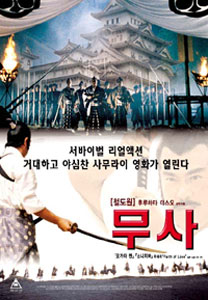

 The rest of these stunt-kids who amounted to a hill of beans, & they invariably dragged down the films they were in, unless one prefers cartoon elements to live-action samurai cinema.
The rest of these stunt-kids who amounted to a hill of beans, & they invariably dragged down the films they were in, unless one prefers cartoon elements to live-action samurai cinema.
 Shinichi "Sonny" Chiba co-stars as one of the key henchmen of the piece; he comes off more like a grease monkey than a samurai, Shozaemon Iba, or Shoza, who serves Lord Abe & is assigned to kill the Shogun's young heir.
Shinichi "Sonny" Chiba co-stars as one of the key henchmen of the piece; he comes off more like a grease monkey than a samurai, Shozaemon Iba, or Shoza, who serves Lord Abe & is assigned to kill the Shogun's young heir. He surrounds himself & much too much of the entire film with Action Club kids pulling absurd antics with twirling spears, flying on ropes, unintentionally whimsical hop skips & jumps with all sorts of mother of camp foolery, pitched to the least discerning kids in the audience.
He surrounds himself & much too much of the entire film with Action Club kids pulling absurd antics with twirling spears, flying on ropes, unintentionally whimsical hop skips & jumps with all sorts of mother of camp foolery, pitched to the least discerning kids in the audience. For all the cornpone nature of the film's content, the sets, costumes, & visual arrangement makes for periodic moments of stunning cinematography.
For all the cornpone nature of the film's content, the sets, costumes, & visual arrangement makes for periodic moments of stunning cinematography. The inevitable duel between Ogata's & Chiba's characters, in a dusty town intended to remind the viewer of better films like Akira Kurosawa's
The inevitable duel between Ogata's & Chiba's characters, in a dusty town intended to remind the viewer of better films like Akira Kurosawa's  The encounter ends with Gyobu's sword broken, thus certain to lose against the bad guy, but not necessarily. When their characters are out of the story, it's up to Hiroki Matsukata as Lord Abe to carry the remainder of the film.
The encounter ends with Gyobu's sword broken, thus certain to lose against the bad guy, but not necessarily. When their characters are out of the story, it's up to Hiroki Matsukata as Lord Abe to carry the remainder of the film.